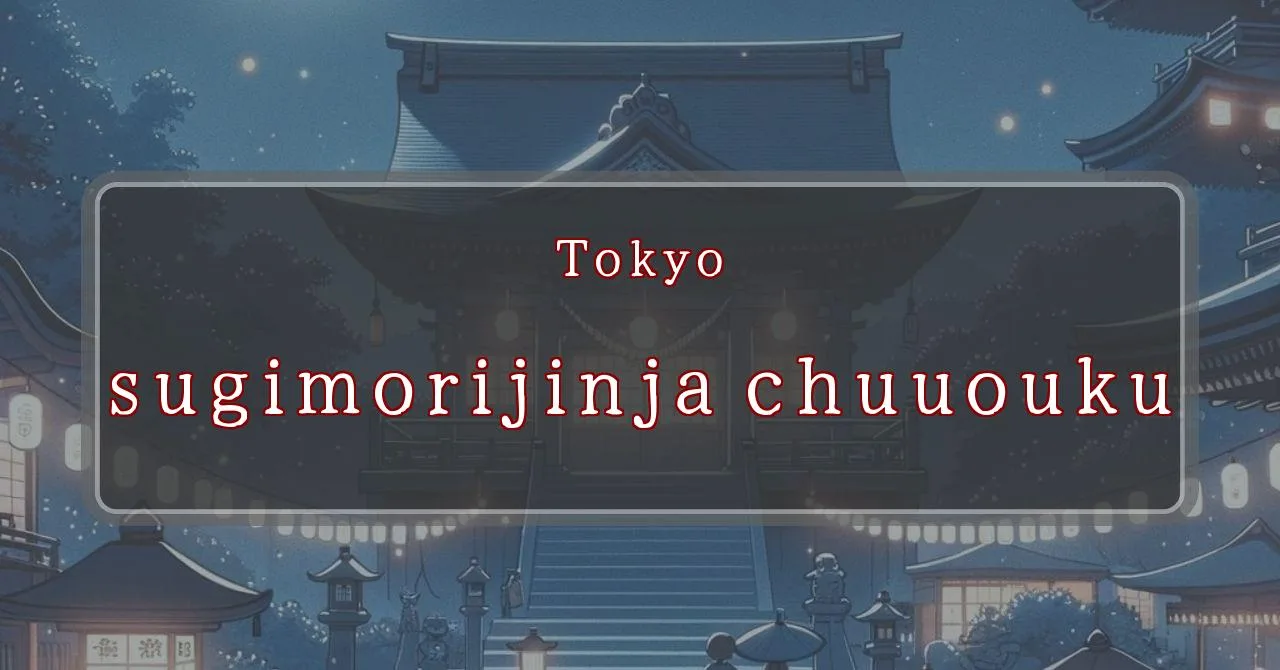Enchanting shrine festival with 300 years of history
Basic Information
Sugimori Shrine is a Shinto shrine located in the Nihonbashi district of Chuo, Tokyo, Japan. It is dedicated to the god Ebisu, one of the Seven Gods of Fortune in Japanese mythology.
- Address: 1-10-2 Nihonbashi-Horidomecho, Chuo-ku, Tokyo 103-0012, Japan
- Phone Number: 03-3661-5462
- Access: 5-minute walk from人形町駅 (Ningyocho Station) on the Tokyo Metro Hibiya Line and Toei Asakusa Line, or a 5-minute walk from 小伝馬町駅 (Kodemmacho Station) on the Tokyo Metro Hibiya Line.
- Festival Days: October 19th (Sat) and 20th (Sun), 2024
Main Events and Attractions of the Festival
The Sugimori Shrine Festival is a lively and colorful event that attracts many visitors each year. The main events and attractions of the festival include:
Mikoshi Procession
One of the highlights of the festival is the mikoshi procession, where a portable shrine is carried through the streets of the Nihonbashi district. The mikoshi is decorated with elaborate carvings and ornaments, and it is carried by a team of people who chant and dance as they make their way through the streets.
Kagura Performance
Another popular attraction of the festival is the kagura performance, a traditional Japanese dance and music performance that is often performed at Shinto shrines. The kagura is performed by a group of dancers who wear colorful costumes and masks, and it tells stories from Japanese mythology and folklore.
Food Stalls
No Japanese festival would be complete without food stalls, and the Sugimori Shrine Festival is no exception. Visitors can enjoy a variety of delicious Japanese foods, such as takoyaki, yakisoba, and taiyaki.
Games and Activities
There are also a number of games and activities for children and adults to enjoy at the festival. These include traditional Japanese games like ring toss and goldfish scooping, as well as more modern games like face painting and balloon animals.
Blessings and Deities
Sugimori Shrine is dedicated to the god Ebisu, one of the Seven Gods of Fortune in Japanese mythology. Ebisu is the god of fishermen, merchants, and wealth, and he is often depicted holding a fishing rod and a鯛 (tai), or sea bream. Visitors to the shrine can pray for good fortune in business, wealth, and prosperity.
Origin and History
The origins of Sugimori Shrine are unclear, but it is believed to have been founded in the 10th century. The shrine was originally located in the Kanda district of Tokyo, but it was moved to its current location in Nihonbashi in the 16th century. The shrine was destroyed by fire several times over the centuries, but it was always rebuilt. The current shrine building dates back to 1931.
Tips and Notes for Visitors
The Sugimori Shrine Festival is a popular event that attracts many visitors each year. If you are planning to attend the festival, here are a few tips and notes to keep in mind:
- The festival is held on October 19th and 20th, 2024.
- The festival is free to attend.
- The festival is held in the Nihonbashi district of Tokyo, which is easily accessible by public transportation.
- The festival is a family-friendly event, and there are many activities for children to enjoy.
- The festival is a popular event, so it is important to arrive early to avoid crowds.
Parking Information
There is no parking lot at Sugimori Shrine. However, there are several public parking lots located nearby. The closest parking lot is the Nihonbashi Mitsukoshi Parking Lot, which is located a 5-minute walk from the shrine.
Popular Stalls and Food Carts in Recent Years
| Type of Stall | Description |
|---|---|
| Takoyaki | A staple at Japanese festivals. Characterized by a crispy outside and a creamy inside. |
| Jaga Butter | A simple yet popular snack of hot potatoes lavishly topped with melted butter. |
| Baby Castella | Small castella cakes, sweet and fluffy treats enjoyed by children and adults alike. |
| Grilled Ayu with Salt | Fresh ayu fish grilled whole with salt, a savory taste of Japanese summer. |
| Shaapin | A unique gourmet item influenced by foreign cuisine, with a chewy skin wrapping the filling. |
| Okonomiyaki | A Japanese grilled dish where you often choose your own ingredients for a personalized flavor. |
| Cotton Candy | A fluffy, sweet snack that’s extremely popular with children. |
| Chocolate Banana | A banana coated in chocolate, a fun and visually appealing dessert. |
| Kushiyaki | Various types of ingredients skewered and grilled, an easy-to-enjoy snack. |
| Yakisoba | Fried noodles mixed with a special sauce, a fast food favorite in Japan. |



